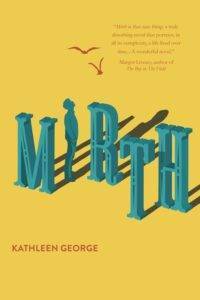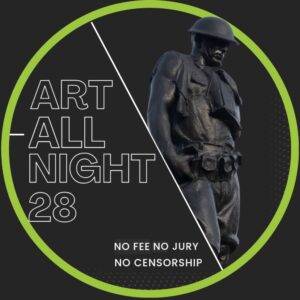“A life story, a love story, a rich roman a clef—Mirth is all these and more. Imagine if John Williams’ Stoner was about the joys of a life well-lived. Kathleen George has fashioned a tender, knowing portrait of a true American romantic.” —Stewart O’Nan, author of Emily, Alone and Henry, Himself
“… a dazzling portrait of a man who lives up to his name, and of those who love him. A wonderful novel.” —Margot Livesey, author of The Boy in The Field
From the Publisher: “Mirth chronicles the struggles of a writer, Harrison Mirth, a romantic man who writes about love and tries to find it through three marriages, in three cities, and always with renewable hope. Amanda is first—New York city and youth. Maggie is second and spans the middle age years—Upstate New York. Liz is third—Pittsburgh and the senior years. Harrison Mirth doesn’t say much to Liz about life before her—a thoughtful comment here and there, funny stories, very little casting of blame. But like a quilt maker, Liz puts these scraps together to make a story—how she thinks he was—a boy, then a man sheltering a secret lake of sadness, but somehow always upbeat, cheerful, a willful optimist, forever innocent. To her, that is irresistible. She wants him, all in all…”
More info About the Author: Kathleen George is the author of When the Blues Walked In (a novel “set against the backdrop of Pittsburgh’s once-bustling Hill District”) and The Johnstown Girls (a novel about the famous Johnstown flood). She has also written seven mysteries set in Pittsburgh: A Measure of Blood, Simple, The Odds, which was nominated for the Edgar® Award from the Mystery Writers of America, Hideout, Afterimage, Fallen, and Taken. George is also the author of the short story collection The Man in the Buick and editor of another collection, Pittsburgh Noir. She is a professor of theater arts and creative writing at the University of Pittsburgh.
Author Site Don’t miss out: George will be visiting Riverstone Books, Mystery Lovers Bookshop, and City of Asylum in early October and November!
“…a beautifully written book. After a childhood of neglect and loneliness, Mirth becomes wildly embracing of all things life-giving: a celebrator of art, and literature, great food, and travel, music and most of all, love. Kathleen George beautifully captures a vulnerable, memorable character and the significant women who have shaped him. This writer has her wise and subtle eye on the contradictions of the heart and extends a spirit of forgiveness to all. She offers up Mirth like a talisman to remind readers of the role love and death-defying pleasure play in an all-too-brief life.” —Jane McCafferty, Drue Heinz Prize winner, author of At First You Try Everything
“Kathleen George’s character Liz is a third wife who cobbles together her husband’s story via other women—beginning to end; he enchants (sooner or later) and is enchanted by women he loves, who love him. George’s treatments of relationships and marriages, the rising and the falling, have the glorious and sad ring of truth to them, how it starts, how it goes at a leisurely pace along its way, and how it closes, the strain. Liz’s part of the story has a kind, good heart, so sweet at the outset, just how falling in love is, both tentative and sudden, inevitable. Any man would be honored to be remembered in this way.” —Paul Kameen, poet, author of Writing/Teaching
“You cannot fail to fall in love with Harrison Mirth. Go ahead. I dare you. In Mirth, George has created a character who follows his passions, for better and worse, whose stark and unyielding appreciation for beauty and zest for life permeates every page. A true meditation on how to live and how to love. Mirth is a wise and wonderful novel, both an exploration of the undulating freedoms and constraints of love and marriage, and a reminiscence of a life well-lived. Mirth will delight you as you read and stay with you long after.” —Meredith Mileti, author of Aftertaste
Q&A with Kathleen George
 This novel spans so many years. Is there a reason you chose to cover such a long timeline?
This novel spans so many years. Is there a reason you chose to cover such a long timeline?
Great question. I got it into my head to do the three phases of our lives. Youth, middle age, old age. And my question to myself was what would happen to an extremely romantic youth as he got older and experienced all the slings and arrows to come. I divided his life into three marriages, three locations/dwellings, and three different life perspectives.
Did you do a lot of research?
Yes, for most of it, and a lot of research for section one which is mainly Manhattan in the late 40s. How much did a subway ride cost? Where were corporate offices located? All kinds of things. Which commuter trains left from Penn and which from Grand Central? I might not remember all the answers now, but I had them as I was writing!
How did you choose the title, Mirth?
I like the word, MIRTH. I just like it. It means laughter, joy—that’s a good thing. Of course there is the literary reference, The House of Mirth. But I thought it was a good name for my character whom I saw as embodying willed optimism throughout his life. Every time I have encountered such characters in literature I have fallen in love. Ross Poldark, Christopher Tietjens (God, I loved Benedict Cumberbatch in that series), Benedick in Much Ado. These characters I adore take the blows and look for the next good thing. They’re highly spirited and they have forgiving natures.
The novel starts with the protagonist’s third wife, when he’s no longer a young man…
This is actually in many ways Lizzie’s story. She is grappling with age and wanting to know what she can’t and didn’t experience—her husband as a boy, as a young man, as a middle-aged man. She cobbles together his story from a hint here or a comment there.
Is there any crime in this book?
My last two novels snuck some crime in. They were also big stories covering many years. In The Johnstown Girls I got to chronicle the lives of sisters caught in the flood of 1889. In The Blues Walked In, I worked on Lena Horne as a fictional character from her 19th year to a time in her sixties. Both of those novels had plot elements that included crimes. Mirth doesn’t. It just didn’t fit.
Do you expect readers to sympathize with any character in particular?
Hopefully everybody. I felt that way as I was writing. I’m not an actress, never have been, but I wear my characters when I’m working and so I can’t help sympathizing. I can’t ever say if they are me or I am them because we’re merged, for better or worse!
Chapter One
He sits at breakfast, marmalade today on a buttered English muffin with his egg, with his juiceoverall a yellow-orange meal. Each day is slightly different to keep breakfast interesting, the sameness and the difference in the right balance. Rhythm, Liz calls it. Sameness: the newspapers, Liz crossing through for coffee, her wiping off the jam he spilled on the newspapers, everything just routinely familiar.
She stops. “Are you all right? You look sad.”
He is a little sad, he admits. A dream has been coming toward him, but he’s pushed it away and let it get blurred by his satisfaction with the marmalade, and now with her question, there it is, taking form like a building in a lifting fog.
Or a ship.
“I had a dream. Let me think. I wassomewhere. In the ocean, on a raft, maybe a raft, safe but not safe? Just floating. And I saw the most amazing huge ship in the distance. A big black ship. I wondered if it would pass me by or come for me. For some reason I didn’t want it to. I tried to make myself invisible. I didn’t wave or anything, but it seemed to be coming toward me. I just watched it.”
“Did it come very close?”
“I woke up.”
“It sounds scary,” she says, rubbing his back. “Gotta shake it off, don’t you think?”
“I guess so.”
“Be super-careful today.”
The dream, now in his conscious mind, keeps nagging at him.
Nags at her, too.
This is the beginning of the end.
This is the beginning of the beginning of the end:
Harrison is off teaching when Lizzie (his third wife) is removing her school papers from the dining table, thinking to prepare rosemary garlic chicken for supperand what? Rice? Polenta?when the doorbell rings.
Two elderly women stand there. The small one asks in a strong but crackly voice, “Is this the residence of Harrison Mirth?”
“It is.”
“My name iswas Mary Jo Martin. I knew Harrison in grade school. And this is my friend, Carol Ann. We were at a 60th class reunion in St. Louis and, well, he wasn’t there because he did his high school up in Vermont,” she says breathlessly, “but then we were driving across the country on our way to New Jersey and we thought we might just manage to see him.”
“Come in. Come in. He’s still at work.” Mary Jo Martin. Ha! Isn’t this the story of the twenty-eight valentines?
“You mean he still works?”
“Teaches.”
“Oh, that’s so interesting. Good for him.”
Guests at dinnertime, then. Harrison will turn somersaults to invite them to stay for dinner, but there are only two chicken breasts, sohe will want to go out to dinner; he’ll make the evening festivehe loves that sort of thing.
Mary Jo Martin. He’ll be excited.
The other woman, Carol Ann, says, “She hitched a ride with me. She’s going to see her daughter in New York. She hates planes. I’m just the chauffeur.”
The two women follow Liz into the kitchen where she digs out a good bottle of red. She finds three passable cheeses and puts them on a board. She digs around in the cupboard and manages a whole basketful of assorted crackers. Mary Jo Martin. Yes, she is the little girl who got twenty-eight valentines from Harrison.
Liz loves that story.
He is still like that, a believer in love. He thrives on domestic lifemarketing, cooking, table settings, positioning a sculpture just so, gazing at his beloved over dinner, touching hands as they watch a TV program.
Liz pours wine and shows the women Harrison’s latest novel, just out, hardcover, to entertain them until he arrives.
“Have you lived here long?” Mary Jo asks as a way of asking if Liz is a permanent fixture.
“Almost twenty years.” Pretty permanent.
Harrison gets home from the university about forty minutes later and takes in the guests with a series of expressions ranging from puzzlement to joy.
Mary Lou is a squat, chubby, perky, well-groomed older woman. Her friend is a lean, tall, ragged type.
“Tell me about your life,” Harrison urges Mary Jo. “Catch me up.”
“Well,” the old flame says, “I now live in Puerto Rico. Long story. But I have a gorgeous villa with a swimming pool and you are welcome to come. Any time.” As an afterthought she nods in Lizzie’s direction to include her in the invitation. “Really. Any time you want. It’s very relaxing. I’m heading back next week after I see my daughter.”
Harrison says, “We’re in the middle of a school term. But thank you for the thought. So, a long way as they say from St. Louis.”
“Oh, yes.” She sparkles, flirting. “I lived in Germany for a while too.”
“Well traveled then.”
“Very well traveled.”
“And the rest of it? Your daughter? Lives in New York?”
“Quick summary of my life: Married three times. Divorced twice. My daughter looked you up, by the way; that’s how we found you. Anyway, widowed once, the third, but now even the other two jokers are dead. (Sorry. That’s how I buoy myself up, by calling them names.) One daughter and she’s in New York, right. My only child. To my first. She’s a mathematician. I have no idea what that means. But she’s in a university, too, like you!”
“And like Liz.”
“Oh. You, too?”
“Yes!” says Harrison, sounding bizarrely proud and urging Liz forward into the kitchen limelight. Liz figures third wives are sort of invisible. She is enjoying thinking about Harrison when he was young. The boy is still there, inside. Liz is fifteen years his junior but today she feels like, oh, the amused and admiring grandmother who gave him paper to make twenty-eight valentines.
“Liz is a writer and professor,” he’s saying.
Mary Jo turns to Lizzie, whose existence can no longer be ignored, and tells the story of her amazing valentine year. “It was so unusual. Of course I was thrilled. And a couple of years later, I had a piano recital and he sent me a huge bouquet of flowers. He was amazing. I’ve never been treated so well since. He set a standard. Nobody else met it. Ah well.”
Lizzie has asked him at other junctures how he knew to make such gestures as a mere boy in a poor neighborhood in St. Louis.
“Movies. I learned my whole personality from movies.” He bought a copy of Swing Time to show her his inspiration, and he took her hand as they watched it. He sang along with Astaire doing “The Way You Look Tonight.”
There he sits now, a personality formed a long time ago by Fred Astaire, Spencer Tracy, Cary Grant, to name a fewa combination of dash, intelligent wry wit, and looks. Interesting, charming men, doing whatever they had to do to win the girl.
Lizzie offers dinner to the visiting duo, having come up with two more pieces of chicken she could defrost, given a little time.
“Ah, no, we really have to get going,” says Carol Ann. She seems uncomfortable, restless. It isn’t clear whether Mary Jo agrees or not that it’s time to go, but after an hour of cheese and wine and some blown kisses, they are gone.
“She got so short,” Harrison says of his old flame. “She used to be tall. And she got old.”
Lizzie gives him a quick peck on the cheek. You’re old, we’re old, you still don’t see it.
“What do you think prompted her to come and observe the wreck?”
“Now don’t be coy. You look fantastic.”
“‘For your age’ is the end of that sentence.”
Lizzie has always loved looking at him, touching him. He is an incredibly beautiful man. “Still,” she says, “still fantastic.”
His arms go around her, and his hug, learned from her, is deep, tight.
“She was coming to see if you’re available.”
“Nah.”
“Oh, yes. That’s how it goes.”
“Oh, dear. But she met you. She got the message.”
“Hope so. I’ll start dinner.”
“I’m bushed. Don’t know why.”
“Visions of the inevitable. Eat some cheese. Get your strength up.”
He smiles. Get your strength up is his line, said every time he presents some temptation in the way of food.
“Did you know the other one?” Liz asks.
“Couldn’t place her. She was somehow familiar but she didn’t seem to want to talk about herself or come forward.”
Liz says, “No. She more or less skulked. I‘d guess she was a redhead in her youth. That coloring.”
Minutes later Harrison says, “Oh. Oh, dear. She might have been one of the O’Neal girls. Not very nice, any of them.”
Liz doesn’t know that story.
She can see himhow he wasat various stages: the little boy who wanted to be like Fred Astaire, the callow, horny, but wholly innocent youth, the angry stoic middle-aged man.
“Lover boy,” she says. “Twenty-eight valentines!”
He smiles.
There are times she sees in Harrison everybody she ever loved, the bad ones and the good ones and likely he sees everyone in her. Time travelers all of us, incarnations, all of us.
“Who were the O’Neal girls?”
“Ugh.”
“Tell me. I want all your stories. I dunno. I’ve never wanted to know anything as much as I want to know you.”
“Good God.”
“You’re vivid.”
“Not boring anyway.”
“Not to me. Never.”
“Neighborhood family. The O’Neals.”
He tells her the story over dinner.
This excerpt from Mirth has been published here courtesy of the author and should not be reprinted without permission.


























